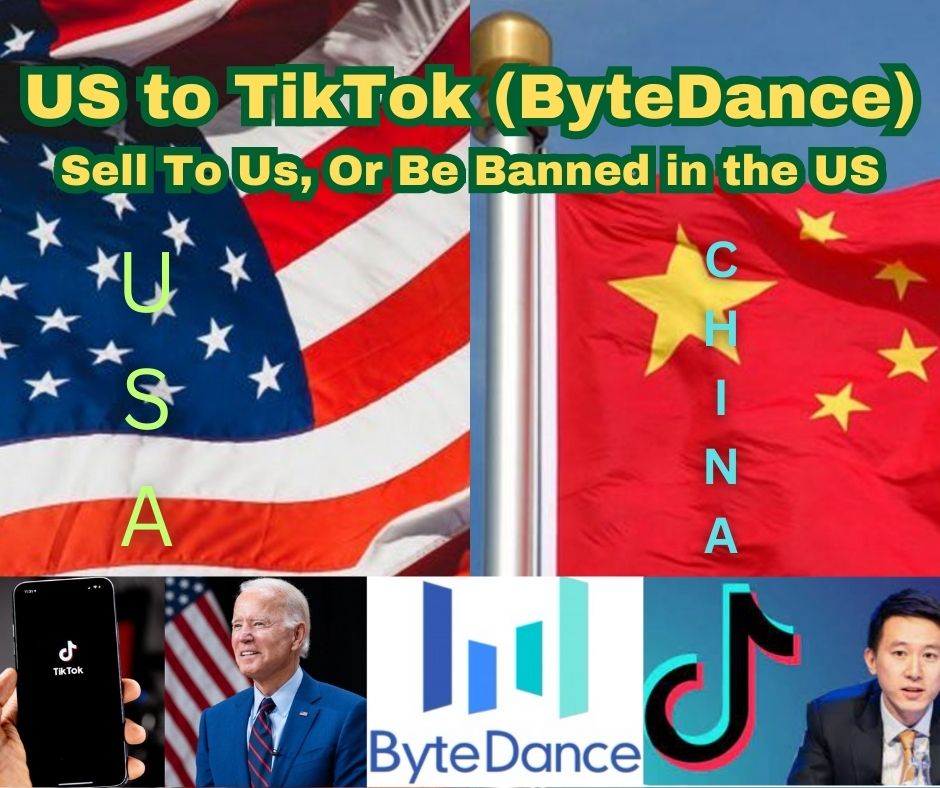
The Threat to TikTok in the US: A Broader Look at the National Security Concerns and the Fragile Relationship between the US and China
In recent years, TikTok has become one of the most popular social media platforms worldwide, with over 1 billion active users. However, its success has also attracted scrutiny from the US government, which has raised concerns over the app’s security, given its affiliation to China through its parent company, ByteDance. The executive order to ban TikTok began during the Trump administration but was rescinded during the current administration of POTUS, Joe Biden. However, the order has currently transcended into a broader directive focused on the investigation into technology linked to foreign rivals such as China and Russia. This directive is facilitated by the multi-agency Committee on Foreign Investment in the US (CFIUS), following years of brokering negotiations between TikTok and the US government. Coincidentally, CFIUS was also involved in the forced sale of LGBTQ dating app Grindr, from Chinese Ownership. This article delves into the real reason behind the threat to ban TikTok in the US.
TikTok’s Sociocultural and Economic Influence on American Pop Culture
TikTok has become a cultural phenomenon and a major player in the social media space in the US and the rest of the world. As of 2021, TikTok had over 100 million active users in the US alone. The app has been credited with launching the careers of several celebrities and musicians, as well as popularizing viral dances and challenges. Additionally, the app has been used as a platform for activism, with users organizing protests and raising awareness about social and political issues. Movements such as #BlackLivesMatter following the murder of George Floyd, #StopAsianHate after a series of violent attacks on Asian Americans, and #MeToo which has helped to address the challenges of sexual and gender-based violence, have all been accentuated by the TikTok social media platform. TikTok has also helped optimize social causes such as Climate Change and disability rights.
US: A History of Cyber Wars
Cyber warfare is an increasingly important aspect of modern warfare, with the US being a key player in this battle theatre. The US has been involved in several high-profile cyber-attacks, including the 2015 hack of the Office of Personnel Management, which resulted in the theft of sensitive personal information of millions of federal employees. The US has also been involved in several cyber-attacks against other countries, including the 2010 Stuxnet attack on Iran’s nuclear program. These events and others have created a toxic space of paranoia in American international relations, leading to mistrust for other nations, especially rival nations.
America’s Mistrust for Other Nations; Especially Rival Nations
The US has a long history of mistrust towards other nations, particularly those it sees as rivals or potential threats. This mistrust is reflected in the operations of the FBI and CIA, which are tasked with gathering intelligence and conducting covert operations to protect American interests. The FBI has been involved in several high-profile investigations into foreign espionage, including the recent case involving a Chinese researcher who was arrested for lying on her visa application and allegedly sharing research with the Chinese government.
The Fragile Relationship between the US and China
The relationship between the US and China has been strained in recent years due to a number of issues, including trade, cybersecurity, and human rights. The US has accused China of engaging in unfair trade practices, stealing American intellectual property, and conducting cyber-attacks against American businesses and government agencies. Additionally, the US has criticized China’s human rights record, particularly its treatment of Uighur Muslims in Xinjiang.
The Real Reason the US Wants to Ban TikTok
The US government’s concerns about TikTok’s security stem from the app’s ownership by Chinese company ByteDance. There are concerns that the Chinese government could use TikTok to access sensitive American data or to spread conceited propaganda. While the CEO of TikTok, Shou Zi Chew, has denied that the Chinese government has ever requested data from the app, the US government remains sceptical about the potential morbidity of its data space.
TikTok Ban: Xenophobia or not?
While the US government’s concerns about TikTok’s security may be legitimate, there have also been instances where such actions have been criticized as being motivated by prejudice or xenophobia. The ban on TikTok has been criticized as being motivated by anti-China sentiments rather than legitimate security concerns. Similarly, the Trump administration’s travel ban on several Muslim-majority countries was criticized as being driven by anti-Muslim sentiment rather than national security concerns; and it may be easier to infer in this situation that the apple doesn’t fall too far from the tree.
Balancing National Security and Free Speech
The US government’s concern about TikTok’s security is valid and cannot be ignored, given the growing role of technology in our daily lives. However, it is important to strike a balance between national security and free speech. The ban on TikTok could set a dangerous precedent and could be perceived as an attack on free speech, especially as TikTok has become a platform for activism and expression.
Furthermore, the ban on TikTok could have economic implications, not only for ByteDance, but also for American companies that rely on TikTok for advertising and marketing. TikTok’s popularity has made it a major player in the advertising industry, and a ban could have ripple effects across the industry.
The Geopolitical Context of TikTok’s Ban
TikTok’s ban must be understood in the broader geopolitical context of US-China relations, particularly in the era of great power competition. As China’s economy has grown rapidly, the country has sought to expand its global influence and compete with the US in areas such as technology and trade. This has led to increasing tensions between the two countries, particularly under the Trump administration, which pursued a confrontational approach to China.
In this context, TikTok’s ban can be seen as part of a larger effort by the US government to counter Chinese influence and protect American national security interests. The US government has expressed concerns that TikTok’s ownership by a Chinese company could allow the Chinese government to access sensitive user data and potentially use the platform for disinformation.
However, the US government’s approach to TikTok has been criticized for being overly aggressive and lacking in transparency. In particular, the Trump administration’s executive order to ban TikTok was widely criticized as being motivated by political considerations rather than genuine national security concerns. The Biden administration’s approach, which has focused on a broader investigation into technology linked to foreign rivals, has been seen as a more measured approach, but concerns about the potential impact on free speech and the economy remain.
The Economic Implications of TikTok’s Ban
TikTok’s ban could have significant economic implications, not only for ByteDance but also for American companies that rely on TikTok for advertising and marketing. TikTok has become a major player in the advertising industry, with estimates suggesting that it generated over $500 million in ad revenue in the US alone in 2020. A ban on TikTok could lead to job losses and reduced revenue for American companies that rely on the platform.
In addition, a ban on TikTok could have a chilling effect on the broader technology industry, as companies become increasingly concerned about government intervention in the market. This could lead to reduced innovation and investment in the technology sector, as companies seek to avoid regulatory scrutiny.
The Role of Free Speech in the TikTok Debate
TikTok’s ban has been criticized by some as an attack on free speech, particularly as the platform has become a platform for activism and expression. TikTok has been used to organize political protests, share information about social issues, and promote diversity and inclusion. A ban on TikTok could limit the ability of users to express themselves and organize for social change.
However, the US government has argued that the ban on TikTok is necessary to protect national security interests. The government has expressed concerns that TikTok could be used by the Chinese government to access sensitive user data or spread propaganda. In this context, the debate over TikTok’s ban raises important questions about how to balance free speech and national security concerns in the digital age.
The Future of US-China Relations
TikTok’s ban reflects broader tensions between the US and China, which have been fuelled by increasing competition in areas such as technology and trade. While the Biden administration has signalled a willingness to engage in dialogue with China, the underlying issues that have led to these tensions are likely to persist.
The US and China are likely to continue to compete in areas such as technology, as both countries seek to establish dominance in emerging industries.
The Touchdown
The threat to TikTok in the US is a complex issue that reflects the broader tensions between the US and China. While national security concerns cannot be ignored, it is important to consider the potential economic and social implications of a ban on TikTok. It is important for the US government to strike a balance between national security and free speech, as well as to continue to engage in constructive dialogue with China to address the broader issues that underlie this dispute. Ultimately, a collaborative and measured approach is essential to addressing these challenges in a way that protects American interests without sacrificing fundamental values such as free speech and open exchange.
-Writer: Oche Anejo-







